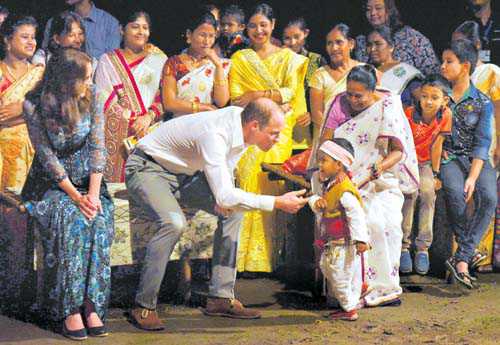
The royal visit is a reminder that the old relationship with Britain is still relevant.
S Nihal Singh
THE visit of the British royal couple, Prince William and Princess Katherine, is a demonstration of Britain’s use of soft power in buttressing the relationship with India built on a not always happy colonial past. Today’s thriving trade relationship, the interaction between millions of Indians settled in the UK and their original home are reasons enough, particularly with an eye on a possible future outside the European Union.
The couple has been carrying out their royal duties as they should, visiting all the right places, meeting the glamorous world of Bollywood and the slum children of Delhi, capped with a power lunch with Prime Minister Narendra Modi. Criss-crossing the country, they took in the Kaziranga reserve underlining wildlife preservation.
There is little doubt that generations of Indians, particularly men and women of the Independence struggle, were deeply influenced by British thought and institutions and treasured an emotional attachment to the UK after India became free. For the new generation, perhaps best represented by politicians of the Bharatiya Janata Party variety, there is no such link, with their emphasis on indigenous in philosophy and mores. But they recognise that Britain represents more than a foreign nation.
The trade relationship between the two countries therefore takes on a greater role than in the past. A second attraction for the new generation is the continuing attraction of a British education, despite the BJP-Rashtriya Swayamsevak Sangh’s aversion to most things Western. Essentially, a British degree sells in the job market and most Sangh Parivar parents live with the contradiction of believing in the supreme wisdom of ancient Indian thought and hankering after a British degree for their children.
Britain herself is going through a difficult period. She was never happy going through the humiliating process of joining the European Economic Community as it then was, hat in hand, and being blackballed by France’s Charles de Gaulle. The UK was finally admitted to the group with opt-out clauses. She is not part of the visa-free travel regime or the common euro currency.
Given Britain’s great imperial past, she was far from psychologically attuned to being just a member of a larger group, with a French-German combine pretty much running the show until Germany’s economic power and Chancellor Angela Merkel’s leadership gained supremacy. On the other hand, in modern times Britons have always believed that they are unique and have chafed at being bound by EU rules and regulations. After Prime Minister David Cameron rashly promised an in/out referendum on the EU, he was given a few face-saving crumbs to persuade his people to remain in the group. The June referendum is like the sword of Damocles hanging over his head.
Against this backdrop, the UK’s relationship with countries such as India (and China) has assumed greater importance. London has a significant trade relationship with Beijing while India is known territory and in economic terms, the fastest growing major economy in the world in a sombre economic environment.
One aspect of the Indo-British relationship that needs urgent attention is the visa mechanism introduced for Indian visitors that is souring the middle class. The process has been farmed out to a contractor and obtaining a visa is like landing on an Indian railway platform catering to the Janata train. You wait for your number being called before handing over your papers to a desk clerk. Getting into the hall in the first place can be a struggle.
It is not diplomatic good sense to charge high visa fees, however great the temptation to make money. The long-term visa fee is out of the reach of the middle class, which means that the process has to be repeated all over again for a second visit. Recent reports suggest that if you are sufficiently rich to spend a small fortune on a visa, officials will come to your home to complete the formalities.
The UK authorities are right in tightening the loopholes to discourage illegal migrants but they are wrong to discourage the middle class, largely the country’s opinion makers, from visiting Britain. I am amused by the email messages I continue to receive from British tourism to savour their delights.
The present generation of Indians do not have the hangover of earlier generations in its relationship with Britain. Generally, it is pragmatic and hard-headed and will turn away from visiting Britain unless compelled by family reasons or urgent business. There are other countries in Europe and the world more welcoming to Indians for touristic and professional purposes.
However, as the British royal couple’s visit has demonstrated, there is a special place in Indian hearts for an old relationship that had its terrible moments and yet conquered generations by the virtues of British values and instruments of administration. The royal visit is a reminder that the old relationship is, in a measure, still relevant in the new context of a trade and economic partnership whether the UK turns away from the EU or stays in it.
The present phase in Britain’s quest for a place in the sun is a troubled one. For decades after World War II, she exercised power by proxy as the trusted adviser to the all-powerful United States. That phase ended with Americans learning the ropes of being a world power and the re-emergence of Germany as the European economic superpower.
There is still latent goodwill for Britain in India. She gave us cricket and as the royal couple played token cricket on a Mumbai maidan in the company of Sachin Tendulkar, they checked one ‘must do’ box. Regrettably, there was no occasion to tick the other box, literate India’s love affair with Shakespeare, with even Bollywood appropriating him for entertainment.
The royal couple has accomplished its task. It is now up to the policymakers of the two countries to give a new impetus to an old relationship.



























